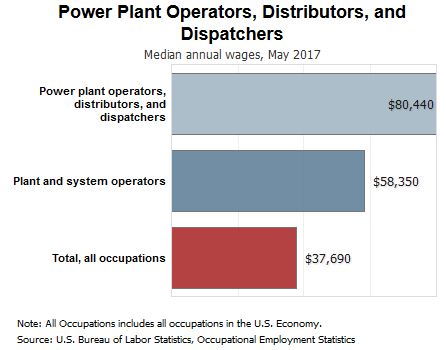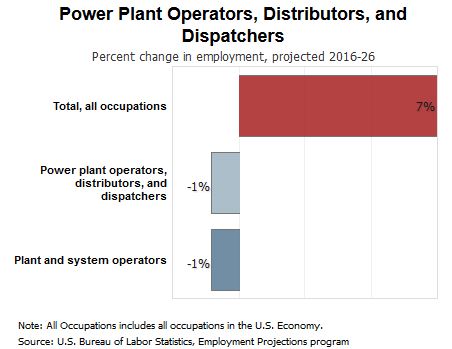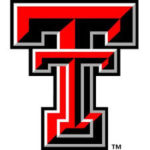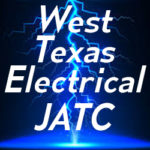Power Plant Operator
| Quick Facts: Power Plant Operators, Distributors, and Dispatchers | |
|---|---|
| 2017 Median Pay | $80,440 per year $38.67 per hour |
| Typical Entry-Level Education | High school diploma or equivalent |
| Work Experience in a Related Occupation | None |
| On-the-job Training | Long-term on-the-job training |
| Number of Jobs, 2016 | 54,700 |
| Job Outlook, 2016-26 | -1% (Little or no change) |
| Employment Change, 2016-26 | -600 |
What Power Plant Operators, Distributors, and Dispatchers Do
Power plant operators, distributors, and dispatchers control the systems that generate and distribute electric power.
Work Environment
Most power plant operator, distributors, and dispatchers work full time. Many work rotating 8- or 12-hour shifts.
How to Become a Power Plant Operator, Distributor, or Dispatcher
Power plant operators, distributors, and dispatchers typically need a high school diploma or equivalent combined with extensive on-the-job training that may include a combination of classroom and hands-on training. Many jobs require a background check and drug and alcohol screenings. Nuclear power reactor operators also need a license.
Pay
The median annual wage for power plant operators, distributors, and dispatchers was $80,440 in May 2017.
Job Outlook
Overall employment of power plant operators, distributors, and dispatchers is projected to show little or no change from 2016 to 2026. Electricity usage is expected to grow; however, technological advances and greater energy efficiency may dampen employment growth.
Power plant operators, distributors, and dispatchers typically do the following:
- Control power-generating equipment, which may use any one type of fuel, such as coal, nuclear power, or natural gas
- Read charts, meters, and gauges to monitor voltage and electricity flows
- Check equipment and indicators to detect evidence of operating problems
- Adjust controls to regulate the flow of power
- Start or stop generators, turbines, and other equipment as necessary
Electricity is one of our nation’s most vital resources. Power plant operators, distributors, and dispatchers control power plants and the flow of electricity from plants to substations, which distribute electricity to businesses, homes, and factories. Electricity is generated from many sources, including coal, gas, nuclear energy, hydroelectric energy (from water sources), wind, and solar power.
Nuclear power reactor operators control nuclear reactors. They adjust control rods, which affect how much electricity a reactor generates. They monitor reactors, turbines, generators, and cooling systems, adjusting controls as necessary. Operators start and stop equipment and record the data produced. They also respond to abnormalities, determine the causes, and take corrective action.
Power distributors and dispatchers, also known as systems operators, control the flow of electricity as it travels from generating stations to substations and users. In exercising such control, they monitor and operate current converters, voltage transformers, and circuit breakers over a network of transmission and distribution lines. They prepare and issue switching orders to route electrical currents around areas that need maintenance or repair. They detect and respond to emergencies, such as transformer or transmission line failures, which can cause cascading power outages over the network. They may work with plant operators to troubleshoot electricity generation issues.
Power plant operators control, operate, and maintain machinery to generate electricity. They use control boards to distribute power among generators and regulate the output of several generators. They monitor instruments to maintain voltage and electricity flows from the plant to meet fluctuating consumer demand throughout the day.
Power plant operators, distributors, and dispatchers held about 54,700 jobs in 2016. Employment in the detailed occupations that make up power plant operators, distributors, and dispatchers was distributed as follows:
| Power plant operators | 36,100 |
| Power distributors and dispatchers | 11,600 |
| Nuclear power reactor operators | 7,000 |
The largest employers of power plant operators, distributors, and dispatchers were as follows:
| Utilities | 72% |
| Government | 17 |
Operators, distributors, and dispatchers who work in control rooms generally sit or stand at a control station. The work requires constant attention. Workers also may do rounds, checking equipment and doing other work outside the control room. Transmission stations and substations where distributors and dispatchers work are typically in locations that are separate from the generating station where power plant operators work.
Because power transmission is both vitally important and sensitive to attack, security is a major concern for utility companies. Nuclear power plants and transmission stations have especially high security, and employees work in secure environments.
Work Schedules
Because electricity is provided around the clock, operators, distributors, and dispatchers usually work rotating 8- or 12-hour shifts. Work on rotating shifts can be stressful and tiring because of the constant changes in living and sleeping patterns.
Power plant operators, distributors, and dispatchers typically need a high school diploma or equivalent combined with extensive on-the-job training, which may include a combination of classroom and hands-on training. Many jobs require a background check and screenings for drugs and alcohol.
Nuclear power reactor operators also need a license.
Many companies require prospective workers to take the Power Plant Maintenance and Plant Operator exams from the Edison Electrical Institute to see if they have the right aptitudes for this work. These tests measure reading comprehension, understanding of mechanical concepts, spatial ability, and mathematical ability.
Education
Power plant operators, distributors, and dispatchers typically need at least a high school diploma or equivalent. However, employers may prefer workers who have a college or vocational school degree.
Employers generally look for people with strong math and science backgrounds for these highly technical jobs. Understanding electricity and math, especially algebra and trigonometry, is important.
Training
Power plant operators and dispatchers undergo rigorous, long-term on-the-job training and technical instruction. Several years of onsite training and experience are necessary for a worker to become fully qualified. Even fully qualified operators and dispatchers must take regular training courses to keep their skills up to date.
Nuclear power reactor operators usually start working as equipment operators or auxiliary operators, helping more experienced workers operate and maintain the equipment while learning the basics of how to operate the power plant.
Along with this extensive on-the-job training, nuclear power plant operators typically receive formal technical training to prepare for the license exam from the U.S. Nuclear Regulatory Commission (NRC). Once licensed, operators are authorized to control equipment that affects the power of the reactor in a nuclear power plant. Operators continue frequent onsite training, which familiarizes them with new monitoring systems that provide operators better real-time information regarding the plant.
Licenses, Certifications, and Registrations
Nuclear power reactor operators must be licensed through the NRC. They typically begin working in nuclear power plants as unlicensed operators, where they gain the required knowledge and experience to start the licensing process. To become licensed, operators must meet training and experience requirements, pass a medical exam, and pass the NRC licensing exam. To keep their license, operators must pass a plant-operating exam each year, pass a medical exam every 2 years, and apply for renewal of their license every 6 years. Licenses cannot be transferred between plants, so an operator must get a new license to work in another facility.
Power plant operators who do not work at a nuclear power reactor may be licensed as engineers or firefighters by state licensing boards. Requirements vary by state and depend on the specific job functions that the operator performs.
Power plant operators, distributors, and dispatchers who are in positions which could affect the power grid may need to be certified through the North American Electric Reliability Corporation’s System Operator Certification Program.
Advancement
With sufficient education, training and experience, power plant distributors and dispatchers can become shift supervisors, trainers, or consultants.
Licensed nuclear power plant operators can then advance to senior reactor operators, who supervise the operation of all controls in the control room. Senior reactor operators also may become plant managers or licensed operator instructors.
Important Qualities
Concentration skills. Power plant operators, distributors, and dispatchers must be careful, attentive, and persistent. They must be able to concentrate on a task, such as monitoring the temperature of reactors over a certain length of time, without being distracted.
Detail oriented. Power plant operators, distributors, and dispatchers must monitor complex controls and intricate machinery to ensure that everything is operating properly.
Dexterity. Power plant operators, distributors, and dispatchers must use precise and repeated motions when working in a control room.
Mechanical skills. Power plant operators, distributors, and dispatchers must know how to work with machines and use tools. They must be familiar with how to operate, repair, and maintain equipment.
Problem-solving skills. Power plant operators, distributors, and dispatchers must find and quickly solve problems that arise with equipment or controls.

The median annual wage for power plant operators, distributors, and dispatchers was $80,440 in May 2017. The median wage is the wage at which half the workers in an occupation earned more than that amount and half earned less. The lowest 10 percent earned less than $49,210, and the highest 10 percent earned more than $108,240.
Median annual wages for power plant operators, distributors, and dispatchers in May 2017 were as follows:
| Nuclear power reactor operators | $93,370 |
| Power distributors and dispatchers | 82,510 |
| Power plant operators | 77,180 |
In May 2017, the median annual wages for power plant operators, distributors, and dispatchers in the top industries in which they worked were as follows:
| Utilities | $81,830 |
| Government | 78,210 |
Because electricity is provided around the clock, operators, distributors, and dispatchers usually work rotating 8- or 12-hour shifts. Work on rotating shifts can be stressful and tiring because of the constant changes in living and sleeping patterns.
Union Membership
Compared with workers in all occupations, power plant operators, distributors, and dispatchers had a higher percentage of workers who belonged to a union in 2016.
 Overall employment of power plant operators, distributors, and dispatchers is projected to show little or no change from 2016 to 2026. Although electricity usage is expected to grow, technological advances and greater efficiency may dampen employment growth.
Overall employment of power plant operators, distributors, and dispatchers is projected to show little or no change from 2016 to 2026. Although electricity usage is expected to grow, technological advances and greater efficiency may dampen employment growth.
Employment of power plant operators in nonnuclear power plants is projected to show little or no change from 2016 to 2026. Power plants are becoming more efficient and, in many cases, have higher electricity-generating capacities. Modernized control rooms in power plants will also provide workers with more information and automate some tasks. As a result, workers are able to work more effectively, which limits the number of new job opportunities.
Employment of power distributors and dispatchers is projected to decline 3 percent from 2016 to 2026. Due to advances in smart grid technology, some tasks that dispatchers perform can be automated, such as rerouting power during an outage. However, some distributors and dispatchers will still be needed to manage the complex electrical grid.
Employment of nuclear power reactor operators is projected to decline 10 percent from 2016 to 2026. No new nuclear plants have opened since the 1990s, and although some are in the application process, opening a new one can take many years. The existing nuclear power plants are also becoming more efficient.
Job Prospects
Job prospects may be limited as technology advances and these jobs become more automated. Many people will seek these high-paying jobs, so those with strong technical and mechanical skills will have better job prospects.

Bureau of Labor Statistics, U.S. Department of Labor, Occupational Outlook Handbook, Power Plant Operators, Distributors, and Dispatchers, on the Internet at https://www.bls.gov/ooh/production/power-plant-operators-distributors-and-dispatchers.htm (visited January 07, 2019).
Salary information comes from the Bureau of Labor Statistics, Occupational Employment Statistics Program, a semi-annual survey that provides wage and employment statistics for the nation, each state, and sub-state regions.
Tagged as Amarillo, Amarillo College, Career, Education, Electricity, Engineering, Harrington Generating Station, Kim Maddox, Occupation, Operations, Power Plant Operator, Texas Workforce Commission, Workforce Solutions Panhandle, Xcel Energy.
Written by Phillip











